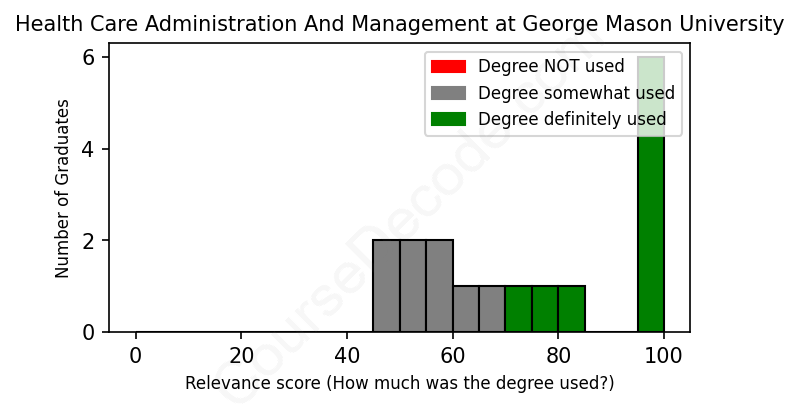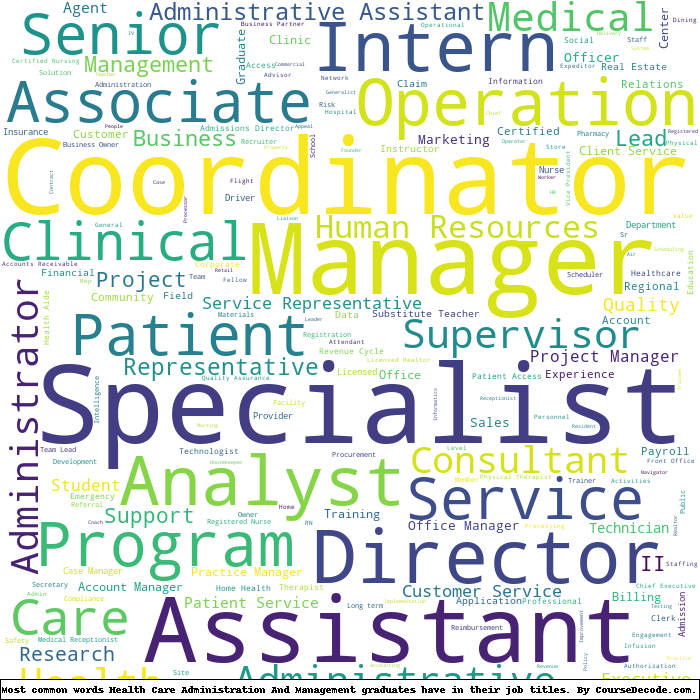
First, some facts. Of the Health Care Administration And Management graduates from George Mason University we've analyzed , here's how many have used (or NOT used) their degree in their career:

These are estimates based on AI analysis of 17 LinkedIn profiles (see below).
The verdict? Above average. Overall, with an average relevance score of 73%, Health Care Administration And Management graduates from George Mason University have a higher likelihood (+6%) of finding work in this field compared to the average graduate across all fields:
And for comparison, here's the chart for all profiles we've looked at across all degrees.
Also, after graduating, only 17% of these graduates have pursued further education other than another Bachelor's degree (such as a Masters degree or other), compared to the average across all profiles of 35%. This suggests a Bachelors degree is enough for most Health Care Administration And Management graduates, and it's normal to look for work straight after graduation.
See the details:
|
Relevance score: 55% We think this person has gone into a career only somewhat relevant to their degree. We think this person has gone into a career only somewhat relevant to their degree.
DEGREE INFOGraduated in 2021 from George Mason University with a Bachelor of Science - BS in Health Care Administration And Management. No other secondary education since. JOB HISTORY SINCE GRADUATIONClinical Management Intern Mason & Partners (MAP) Clinics Jan 2021 - May 2021 Patient Access Associate 1  Inova Health System Sep 2021 - Oct 2022 Patient Registration Coordinator  Option Care Health Oct 2022 - Present ABOUTNo information provided. |
The top 10 most common jobs done by the graduates we've analyzed (ranked most common to least) are:
When looking at the job profiles of individuals who graduated with a degree in Health Care Administration and Management from George Mason University, a variety of positions pop up. Many graduates seem to explore roles like Administrative Assistant, Customer Service Manager, and Patient Services Specialist. While some of these roles offer relevant skills in managing communication and organizational tasks, they don’t all directly apply healthcare-specific knowledge. For example, jobs in retail or unrelated sectors, like being a server or working in logistics, actually steer away from healthcare settings entirely. However, there are also several notable positions that are very much in line with a career in health care administration, such as Breast Health Coordinator and Certified Tumor Registrar, which directly utilize the skills learned from their studies.
Overall, it's a mixed bag. Some graduates found themselves in positions that harness the knowledge they gained, especially in healthcare environments like hospitals or health systems, where they could engage with patient care and administration directly. Yet, a significant number ended up in roles that, while possibly enhancing their general management skills, didn't capitalize on their specialized education in health care. This varying degree of relevance highlights the challenge graduates face as they enter the workforce, often needing to draw connections between foundational management skills and specialized healthcare knowledge to truly leverage their degree.
Here is a visual representation of the most common words in job titles for Health Care Administration And Management graduates (this is across all Health Care Administration And Management graduates we've analyzed, not just those who went to George Mason University):

Graduates from George Mason University who studied Health Care Administration and Management seem to have some pretty varied career paths, especially in the early stages after graduation. For many, their first jobs tend to be in entry-level administrative roles like administrative assistant or customer service positions, which makes sense because those are essential for gaining experience in the healthcare field. However, a notable number find themselves gradually transitioning into more specialized healthcare roles, particularly in patient services or healthcare management. For example, those who did internships during their studies often secure good positions in hospitals or healthcare organizations shortly after graduation.
Fast forward five to ten years down the line, and it looks like many of these graduates have made significant strides in their careers. Several end up in more advanced roles such as healthcare consultants, patient services supervisors, or even specialized positions like Certified Tumor Registrar. Others branch out into related fields like data analysis or program management within healthcare systems. While not everyone stays within direct healthcare administration roles, many still find fulfilling jobs that utilize their degree. Overall, alumni from this program tend to have strong career trajectories, moving into roles that are relevant to their studies and making a noticeable impact in the healthcare landscape.
Honestly, a Bachelor’s degree in Health Care Administration and Management can be a mixed bag in terms of difficulty. At George Mason University, it’s generally considered manageable, especially if you have an interest in the healthcare field and are willing to put in the effort. You'll tackle subjects like healthcare policy, ethics, and financial management, which can get a bit complex, but it's not typically as rigorous as STEM degrees. If you stay organized and engage with the material, most students find it pretty doable. Like any degree, though, it really depends on how seriously you take your studies; some courses may challenge you, but it’s all about finding your groove!
Most commonly, in the LinkedIn profiles we've looked at, it takes people 2 years to finish a Bachelor degree in Health Care Administration And Management.
Looking at the job trajectories of these George Mason University Health Care Administration and Management graduates, it seems like they’re doing pretty well in general, but it definitely varies. Some folks jumped into solid roles pretty quickly, like those who became healthcare specialists or project managers, which usually pay decently, especially in healthcare settings. Others took a more winding path with roles like server and administrative assistant before landing better positions, which might've kept their incomes lower at first. Overall, while they might not all be rolling in cash right now, many have climbed the ladder into some good-paying jobs, especially those with ongoing roles in healthcare organizations. So, yeah, it looks like there's potential for decent earnings as they move up and gain experience!
Here is a visual representation of the most common words seen in the "about" section of LinkedIn profiles who have a Bachelor degree in Health Care Administration And Management (this is across all Health Care Administration And Management graduates we've analyzed, not just those who went to George Mason University). This may or may not be useful:

Here are all colleges offering a Bachelor degree in Health Care Administration And Management (ordered by the average relevance score of their Health Care Administration And Management graduates, best to worst) where we have analyzed at least 10 of their graduates: